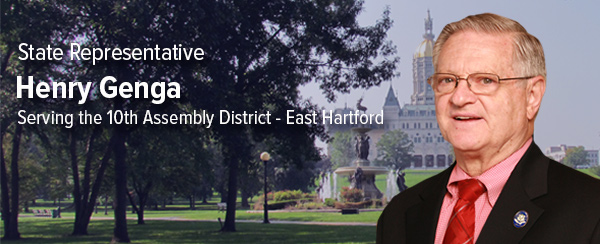
February 20, 2013
Distinguished chairs Senator Maynard and Representative Guerrera, and honorable members of the Transportation Committee: I am State Representative Henry Genga and I am here to speak in support of House Bill 5380 - "An Act Prohibiting Smoking in Motor Vehicles with Minor Children." I proposed this law after I was contacted by a constituent, Justin Kvadas, who was an eleven year old student and is now 17.
The purpose of this law is to educate the public and protect small children under the age of 7 years and weighing less than sixty pounds from secondhand smoke. This law is not primarily about punishment but about the protection of our children.
Over the last 20 years much has been learned and discovered both scientifically and medically about the effects of smoking. Studies by the University of Harvard, Stanford University, the Surgeon General of the United States, and others report that the confmed space of a motor vehicle increase the exposure to environmental tobacco smoke. The Center for Disease Control reports that one cigarette emits 11 cancer causing poisons and 250 known carcinogen toxins. The reports from Harvard and the Surgeon General state that even if the windows are rolled down the level of exposure is still above safe levels, and that there is no difference in the risk to the child whose immune system is still developing and vulnerable to these toxins in the air.
Putting these fragile little bodies in a confined area and allowing people to blow smoke into their lungs should not be allowed.
Here are the facts:
The public is already responding to these hazards and four states have already acted to protect children from the dangers of secondhand smoke. Louisiana, Arkansas, California, and Maine along with the Commonwealth of Puerto Rico have passed laws and ordinances similar to this legislation. Six states restrict smoking in vehicles carrying children in the care of childcare facilities. The enforcement of this Jaw would mirror that of children required to be in a seatbelt restraint and would not be any more difficult to enforce. It would be an infraction and the first violation in the first year would be a warning. The Connecticut Police Chiefs Association and the Attorney General for the State of Connecticut George Jepsen have endorsed this bill.
To those who would say that Government shouldn't try to regulate what you do privately in your home: I say that your home is your home; it is a private and personal area. However unlike your home a car is a confined area that is in the public eye. Consider that children do not have the choice of whether or not they get exposed to secondhand smoke in the car. It is not invasive to protect the health and wellbeing of children who cannot afford to be exposed to secondhand smoke. The car is the smallest most confined space that anyone smokes in and the child is a captive, especially when the child is strapped in the car seat. Legislation such as this is aimed at the protection of those who cannot protect themselves.
In Maine, Rep. Brian Duprey R-Hampden, a Libertarian, proposed this bill and it passed. He said he was moved to action by the sight and smell of children showing up at his childcare business often sick and smelling of tobacco. After the City of Bangor in Maine passed similar legislation, Duprey said "The children smelled better and the rate of illness dropped sharply. This works and "This is the right thing to do."
There is no denying the effects of secondhand smoke. The facts are indisputable and something needs to be done. The State has an obligation to protect the lives of kids and secondhand smoke has been proven to be harmful to children. Adults have a choice when it comes to smoking in cars; children do not- they need our protection.
Thank you for your time and consideration.
PROTECT THOSE WHO CANNOT PROTECT THEMSELVES!
AN ACT PROHIBITING SMOKING IN MOTOR VEHICLES WITH MINOR CHILDREN
Purpose:
The following statistics are taken from the American Lung Association:
Enforcement:
Government Role:
"This common sense legislation will help protect the most vulnerable and precious members of society from well documented dangers of second-hand smoke. We currently require children to receive vaccinations and wear helmets while riding bicycles. Protecting children in a confined area from the pernicious effects of second-hand smoke is consistent with these measures."
Statement from Attorney General George Jepsen"There is no risk free exposure to second hand smoke."
2006 Surgeon General
Issues:
"Small children can be free of second hand smoke if the smoker cracks open the car window."
Response:
"The levels of contaminants during open-windows conditions, though significantly less than when the windows were closed, were still unsafe." These are the results of a study conducted by the Harvard School of Public Health. This study substantiates how hazardous second hand smoke is to small children and the elderly. This was confirmed by another scientific study with Stanford University researchers.
Smoking in cars even with the windows open, can produce smoke pollution that compares with smoky bars or restaurants. Children are more vulnerable to second hand smoke because they breathe more air relative to their bodyweight and thus absorb more tobacco smoke toxins. Their lungs are still developing and one cigarette emits eleven cancer causing poisons and 250 known carcinogen toxins.
States that have recently passed similar legislation:
Please contact Representative Henry Genga if you wish any additional information: 860-240-8585,
1-800-842-8267 or henry.genga@ct.cga.gov